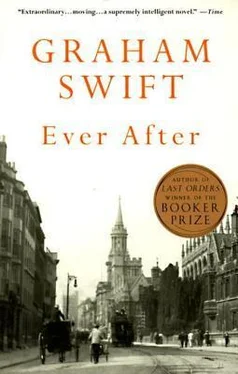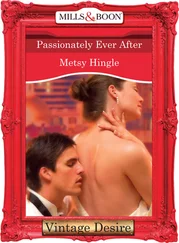He seemed surprised at his own words, as if he had not known they were stored inside him. He looked selfconsciously at his watch.
“Whatever can your mother be up to?”
Perhaps it was on that same evening — but this surely would have been sooner after our arrival — that I had asked him, point-blank, what were we doing, what was he doing, here in Paris? And he’d replied, with a sort of jocular, self-effacing gravity, “Oh — sorting out the world. You know, that sort of thing.”
Only once can I remember his attempting to show me the sights of Paris. We had scarcely set out — our first port of call was Napoleon’s tomb — when an icy shower caught us, the first of a series which would turn our jaunt into a stoical exercise. I could not help feeling how I would much rather have been with my mother. How she would have turned a change in the weather into a positive pleasure. Wrestling, laughing, with an umbrella. Scurrying into the aromatic warmth of a café and ordering, in an Anglo-French that was infinitely more convincing if no more proficient than his, “ Un crème, un jus d’orange ,” and, falling back into expressive English, “and two of those wicked little tarts!”
Seeing the sights of Paris with my mother! Shopping sprees with my mother in Paris! From her I learnt to see the world as a scintillating shopwindow, a confection, a display of tempting frippery. From her I learnt the delights of ogling and coveting and — by proxy and complicity — spending. I would go with her to spend money. To buy hats, necklaces, gloves, shoes, dresses, cakes. I would wait, perched on a velvet-backed chair, smiled at by the attentive vendeuse , while, behind drawn plush curtains, things slithered, rustled, snapped, to an accompaniment of sighs and hums. In the city of perfume we bought perfume. In the city of lingerie we pondered over lascivious creations of silk and lace. If they were meant expressly for his eyes, it only made his noble loftiness the more impressive; but I suspected — I knew — they were not. And in all this I was the adjudicator, the referee, the scapegoat. The oyster-grey or the rose-pink? “Oh, you decide, sweetie. No, you can’t? Bien, tous les deux, s’il vous plaît, Madame .” “ Tous les deux, Madame? Ah oui, d’accord. Le petit est bon juge, n’est-ce pas?”
Coming out with her booty, she would hug me ardently, as if it were I who had enabled her so successfully to succumb. In the same way, prior to such purchases, when her eyes fell on anything particularly delicious and desirable in a window, she would squeeze me fiercely, conspiratorially, giving an Ooh! or an Aah! as if it were I alone who could tilt the balance between mere looking and rushing headlong into the shop. “But isn’t it just heavenly , darling?” I could have lived for, lived in that squeeze. Until I grew up and realised it was almost entirely selfish. She might as well have been hugging herself, or a handy cushion or spaniel.
Sorting out the world! He should have sorted out himself and his own jeopardized household. Did he know — but he must have done from the very beginning, he must have known what she was “up to”—that while he was busy sorting out the world and “talking with the Allies” (another cryptic phrase, which made me think of some gossipy, over-neighbourly family) and I was busy at the little école for foreigners they found for me, “Maman,” as I’d begun precociously to call her, was busy entertaining or being entertained by Uncle Sam, or plain Sam Ellison as he then was, who had his own recipe for sorting out the world, expressible in one single, vulgar word: plastics? In Maman ’s defence, it could be said that she too was engaged with the Allies, Sam being American. And in Sam’s defence, it could be said that, fuelled as it was by rank commercialism, he too had a sense of mission.
“It’s the stuff that’s gonna mould the future. I mean, literally. Anything from a coffee cup to an artificial leg, to the sock that goes on it.”
“And then there’s plastic surgery.”
“No, that’s kinda different, sweetheart.”
(As my mother, an expert at lash-fluttering fausse-naïveté , well knew.)
He must have known. If I could sniff these matters out, even in their early, covert stages, then he— But then I was a virtual accomplice. When I emerged from my école in the afternoon to see Sam just dropping Maman off from a taxi, or made my own way home to find her in a distinct state of having hastily bathed and dressed, I would receive not guilty looks but one of her swift, smothering, implicating hugs — essentially no different from her shopping hugs. Thank you for letting me buy that dress — isn’t it gorgeous? Thank you for letting me fuck Sam — isn’t he divine ? And, yes, that word had only to spring from her lips and I believed it to be so. I thought Sam — six feet of hard-muscled American avarice — was divine, and I thought crêpe suzette and tarte tatin were divine, and I thought oyster-grey silk cami-knickers were divine, and I thought my mother’s laughter, the sheer, vicious gaiety in her eyes, was divine.
“Do up my buttons, sweetie, would you? There’s an angel.”
A whole world existed in which men did up the backs of women’s dresses at four o’clock in the afternoon.
I can see it now, that apartment above the Rue de Bellechasse. Its ponderous furnishings, its tarnished chandeliers, its diplomatic decorum under perpetual threat from my mother’s chatter and laughter, from her gusty scurryings from room to room, and — but this was hardly a threat — from her magic snatches of song. I learnt never to ask, never to prompt, never to wait. Only to recognise the likely moments: in the evenings when the traffic outside began to toot in a distinctly perkier fashion; after one of her unspecified “lunch engagements”; in moments of lingering and meaningful déshabille . Lights coming on in the streets. Wafts of scent. The gurgle of bath water running and, above it, lilting, throbbing: “Dove so-ono i bei momeenti …”
And what world was he sorting out? Some new, rebuilt world which would one day be unveiled to the dazzlement and shame of such backsliders as Mother and me? Or some old, dream-world restored, in which implacable British sergeant-majors bawled for ever over far-flung parade grounds and men followed well-trodden paths to glory and knighthoods?
He was fifty-five. And I had the insight of an infant. But it seems, now, that I could have told him then: that world was gone. An axe had dropped on it.
And yet — Paris was still Paris. Even the Paris that a year ago had emerged from four years of occupation. The chestnuts kept their ranks; café tables spawned; a thousand mansarded roofs glinted in the autumn sunshine, without a bomb-site among them. By the following spring, Paris had the air of something simply resumed. It was only winter, not a world war, that had passed: shutters flung open; awnings lowered; bed linen hanging from upper windows; merchandise once more filling the shops, to be pillaged by my mother.
Paris. April in Paris. I had never seen Paris before, and yet even at nine years old I had this recurring sensation of encountering a vision made fact. If the trompe-l’œil Paris of La Bohème was an illusion, then on my journeys on foot between our apartment and the école , journeys which took a meandering form and had something to do, I suppose now, with a sense of having lost the right path with my parents, I daily disproved the illusion: Paris was the living, breathing rendition of itself.
“… di dolce-ezza e di piacer …?”
Somewhere on those wanderings to and from school, in the crisp, rimy breath of a January morning, I looked up from the pavement through a tall, lighted window and saw — a true vision. Three — four, five — ballerinas, dressed in leotards and tights, swathed in woollen leg-warmers, dipping, stretching, balancing, raising one leg, extending one arm in that curving way ballet-dancers do, while clinging with the other to a wall bar. I stood transfixed, entranced.
Читать дальше












